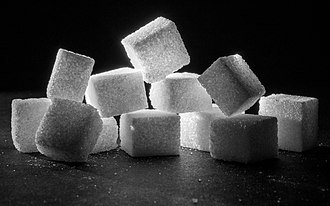White sugar



White sugar, also called table sugar, granulated sugar, or regular sugar, is a commonly used type of sugar, made either of beet sugar or cane sugar, which has undergone a refining process. It is nearly pure sucrose.
Description
The refining process completely removes the molasses from cane juice or beet juice to give the disaccharide white sugar, sucrose. It has a purity higher than 99.7%. Its molecular formula is C
12H
22O
11. White sugars produced from sugar cane and sugar beet are chemically indistinguishable: it is possible, however, to identify its origin through a carbon-13 analysis.
White sugar (and some brown sugar) produced from sugar cane may be refined using bone char by a few sugar cane refiners. Beet sugar has never been processed with bone char and is vegan. In modern times, activated carbon and ion-exchange resin may be used – see Sugar refinery § Purification.
From a chemical and nutritional point of view, white sugar does not contain—in comparison to brown sugar—some minerals (such as calcium, potassium, iron and magnesium) present in small quantities in molasses. The only detectable differences are, therefore, the white color and the less intense flavor.
Health Impacts
The overconsumption of white sugar (or any sugar) brings many health consequences. Such as heart disease, obesity, type-2 diabetes, and more. The CDC recommends limiting daily sugar consumption to less than 200 calories worth (about 12 teaspoons/48 grams) on a 2000 calorie diet.
References
Related items
External links
- All about White sugar – The Spruce Eats